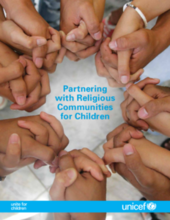This document is intended as a guide, primarily for UNICEF staff and partners, to building effective partnerships with larger religious, and local faith, communities and networks, especially religious leaders. Religious communities are often key actors in working with vulnerable children and families and experience dictates that it is important for child rights actors to have adequate knowledge, skills and attitudes for effective and constructive collaboration with religious communities.
This guide suggests that partnerships with religious communities should contribute to children’s well-being by building on the assets of these communities, meanwhile learning from them to shape programme priorities. In many contexts where child rights organizations work, religious beliefs are a significant factor in determining community attitudes and behaviour. Programmes need to understand the positive or negative dynamics and take religious factors into account in all components of programming. Within such contexts, the question is not whether to engage with religious communities, but how.
This document provides an understanding of how and why religious communities can positively contribute to the promotion of child rights, presents concrete examples of collaborative work in the main areas of UNICEF programming and advocacy, addresses the challenges presented by the misuse of religion, outlines strategies for effectively engaging with religious communities, briefly discusses some approaches to planning, monitoring and evaluation of partnership programming, and highlights key actors and resources.

